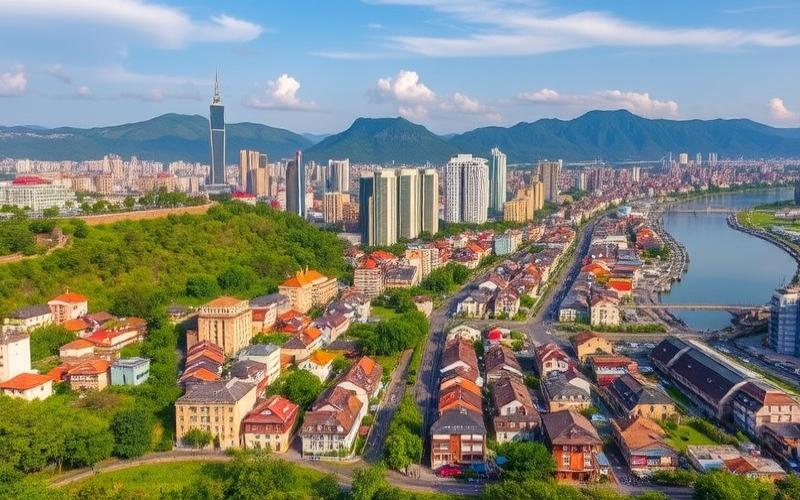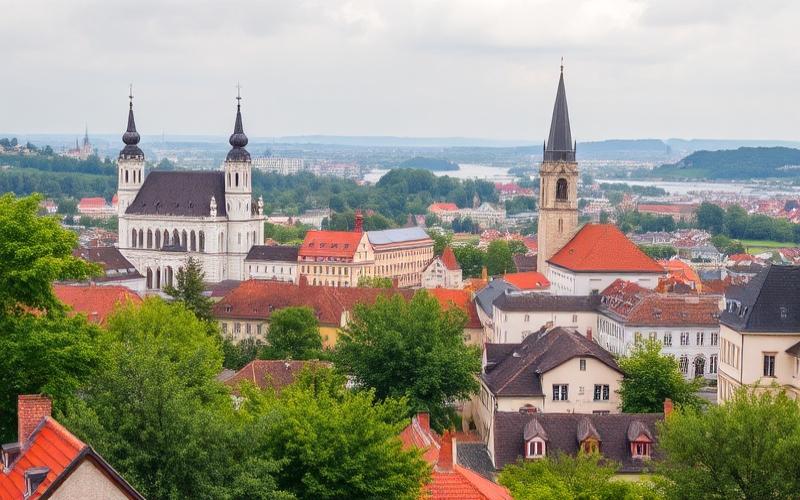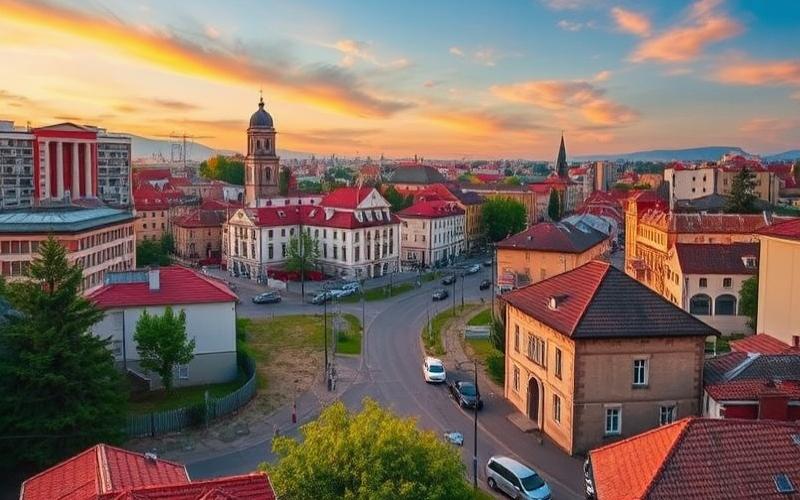
 Published on and written by Cyril Jarnias
Published on and written by Cyril Jarnias
Hungary: The New Hotspot for Digital Nomads
In the heart of Central Europe, Hungary is becoming a dynamic crossroads for a new generation of travelers: digital nomads. With its unique combination of historical heritage, vibrant culture, and attractive living costs, this country is increasingly appealing to remote workers seeking a more flexible and enriching lifestyle.
Good to Know:
Budapest, the Hungarian capital, is often ranked among the top 10 cities for digital nomads in Europe.
A Notable Impact on the Rental Market
However, the growing influx of these nomadic professionals is creating unprecedented pressure on the local rental market. Cities like Budapest are already seeing a significant rise in rents, as landlords adjust their strategies to capitalize on this new demand.
A Significant Societal Debate
This phenomenon raises crucial questions about balancing economic interests with the well-being of local residents, sparking a passionate debate on the sustainability and social implications of this trend.
Understanding the Digital Nomad Phenomenon in Hungary
A digital nomad is someone who works remotely, primarily via the internet, while traveling or temporarily settling in different countries. This lifestyle is built on geographic flexibility and professional autonomy.
Hungary, particularly Budapest, is attracting more of this community for several reasons:
- Affordable cost of living
- Dynamic cultural scene
- Rich history and remarkable architecture
- Introduction of a specific visa called the “White Card” allowing non-European remote workers to reside legally for up to two years
Digital Infrastructure
- Very fast, stable, and widely available internet connection in major cities like Budapest
- Wide selection of modern coworking spaces equipped with high-speed Wi-Fi and meeting rooms
- Cafés suitable for nomadic work with accessible power outlets
List of Main Coworking Spaces in Budapest:
- Impact Hub Budapest
- KAPTÁR Coworking
- Loffice
- Kubik Coworking
Accessibility of Essential Services
- Numerous furnished accommodations available (Airbnb/private apartments)
- Easy access to local platforms for medium-term rentals, even for foreigners
- Availability of digital banking services
- Efficient public transportation quickly connecting all central neighborhoods
Summary Table:
| Infrastructure | Availability | Remarks |
|---|---|---|
| High-speed internet | Very high | Widespread fiber optic |
| Coworking spaces | Numerous | Affordable rates |
| Temporary housing | Abundant | High demand in central areas |
| Digital banking services | Accessible | Easy setup for expatriates |
Typical Profile of Digital Nomads in Hungary
List of Observed Characteristics:
- Dominant sectors: IT/web development, graphic design, digital marketing, international consulting
- Varied geographic origins: strong presence of Europeans (Poles, Croats, Slovenes), Americans, and some Asians
Contribution to the Local Economy:
- Increased consumption in dining/cafés/urban leisure activities
- Long or medium-term rentals boosting the real estate market
- Occasional participation in the local entrepreneurial ecosystem (tech/startup meetups)
Challenges Related to Their Presence
Summary List:
- Moderate but notable increase in rent prices in certain neighborhoods popular with expatriates
- Growing demand for short/medium-term furnished housing
- Potential tension with local residents seeking affordable central housing
The growing arrival of digital nomads stimulates certain local economic sectors but also contributes to pressure on the urban rental market—especially in sought-after central neighborhoods. This balance poses a challenge for municipal policies aiming to attract these profiles without harming the local social fabric.
Good to Know:
Digital nomads, remote workers leveraging technology, often choose Hungary for its affordable cost of living, rich cultural heritage, and robust digital infrastructure. Budapest, in particular, is equipped with numerous modern coworking spaces offering fast and reliable internet connections. Digital nomads in Hungary primarily come from Europe and North America, working in various sectors like tech, digital marketing, and content creation. Their contribution to the local economy is visible through growth in dining, entertainment, and short-term housing services. However, this influx has driven up rental prices, increasing demand in certain popular neighborhoods. To address these challenges, it’s crucial for Hungary to continue developing suitable housing solutions and support the expansion of collaborative workspaces that meet the needs of this dynamic community.
The Rise of Coliving for Digital Nomads in Hungary
Coliving is a form of shared housing designed primarily for digital nomads and remote workers. It differs from traditional shared housing by its emphasis on community, collaboration, and exchange, with common spaces designed to foster productivity and professional networking. Residents find not only housing but also a stimulating environment where they can work, learn, and build connections with like-minded individuals.
Why Does Coliving Meet the Specific Needs of Digital Nomads?
- Integrated Community: Helps combat the isolation often felt during frequent travels.
- Work-Adapted Spaces: Integrated coworking or private offices promote focus and efficiency.
- Contract Flexibility: Weekly or monthly rentals suited to a mobile lifestyle.
- Access to Included Services: Social events, professional workshops, utilities included.
Factors Explaining the Rise of Coliving in Hungary (Especially Budapest)
- Moderate cost of living compared to major European metropolises
- Reliable and fast internet connection
- Cosmopolitan city attractive to young professionals
- Dynamic tech ecosystem (startups, incubators)
- Easy geographic access from across Europe
Infrastructure Supporting the Coliving Lifestyle in Hungary
Spaces available in major cities:
| Infrastructure | Characteristics |
|---|---|
| Integrated Coworking | Dedicated spaces in each residence |
| Digital Services | High-speed Wi-Fi included |
| Events & Workshops | Regular sessions on networking or professional development |
| Online Communities | Private groups for resident exchanges |
Typical examples of amenities offered:
- Multipurpose rooms (meetings, yoga, etc.)
- Equipped shared kitchen
- Relaxation & leisure area
Concrete Examples of Coliving Communities in Hungary
Summary presentation in table form:
| Place Name | Type of Offer | Community Specifics |
|---|---|---|
| KAPTÁR Coliving | Studios + coworking space | Very active local network |
| Urban Nomads Budapest | Private rooms + open space | Mentorship program & weekly events |
| Impact Hub Residence | Modular apartments | Direct access to entrepreneur networks |
Communities frequently organize:
- Mastermind sessions among members
- Themed shared dinners
- Urban cultural discovery outings
These activities create a genuine supportive network where everyone benefits from sharing both professional and personal experiences.
Impact on the Hungarian Rental Market
Economic Benefits
- Optimization of urban real estate occupancy rates
- Attracts international clientele generating additional local income
Potential Challenges
- Gradual increase in rents in certain sought-after neighborhoods
- Risk of real estate saturation if supply doesn’t meet growing demand
Summary Table:
| Economic Effect | Advantage | Challenge |
|---|---|---|
| Rent Increase | Local Investment | Reduced Accessibility |
Illustrative Testimonials / Anecdotes
“Upon arriving at the coliving in Budapest, I was welcomed by a tight-knit community that helped me integrate quickly. The workshops organized each week boosted my freelance project through collective feedback.”
“The cultural mix here is impressive; I collaborated with three different nationalities during an internal hackathon organized by our residence.”
“The flexibility allowed me to extend my stay without administrative constraints—ideal when working remotely!”
Future Perspectives in Light of Digital and Remote Work Evolutions
- Expected growth due to the widespread adoption of remote work
- Diversification into smaller Hungarian towns
- Increased integration of specialized services (digital continuing education)
- Hybrid models combining flexible housing + premium services
In the medium term, this model could more broadly inspire Hungarian real estate players in response to new connected lifestyles.
Thus, coliving is establishing itself as an innovative response, both social and economic, to the challenges posed by contemporary digital nomadism.
Good to Know:
Coliving, a concept allowing individuals to share living spaces while having private offices and common areas, perfectly meets the needs of digital nomads by offering flexibility and community. In Hungary, Budapest stands out as a prime destination for these professionals, thanks to its advanced technological infrastructure and attractive living costs. Coliving spaces often include integrated coworking and dedicated services, such as flexible subscriptions and networking events. Notable examples include Kaptár and Impact Hub, which provide stimulating environments conducive to creative and professional exchanges among residents. This phenomenon fuels increased rental demand, contributing to improved real estate standards but also intensifying pressure on rents. Testimonials reveal how coliving facilitates integration and the establishment of social connections, while offering a balance between private life and community. The rise of remote work is expected to strengthen this trend, encouraging property owners and investors to adapt their offerings, while requiring careful regulation to avoid market imbalances.
The Impact of High-Speed Wi-Fi on Destination Choice
Fast internet connectivity is a non-negotiable criterion for digital nomads, whose productivity depends on reliable and high-performance web access. For these professionals, the ability to participate in video conferences, transfer large files, or access collaborative tools in real-time dictates their choice of destination.
- Remote workers prioritize cities and regions with robust high-speed infrastructure, to ensure an uninterrupted, low-latency work experience.
- Network quality also influences access to digital services (banking, administration, professional platforms), essential to the daily lives of digital nomads.
- Easy access to public or private Wi-Fi in coworking spaces, cafés, and rental accommodations becomes a competitive advantage for a city.
| Access Type | Average Download Speed (Mbps) | Upload Speed (Mbps) | Ping (ms) |
|---|---|---|---|
| Fixed Broadband (Telekom) | 172.2 | 114.7 | 39 |
| Fixed Broadband (National Average) | 121.1 | 67.1 | 41 |
| Mobile (Yettel) | 96.3 | 23.8 | 42 |
At the beginning of 2025, Hungary showed a median fixed broadband speed around 198 Mbps, with notable progress (+28% year-over-year). Mobile speeds reach nearly 57 Mbps on average. The country ranks 17th globally for mobile speed, thus guaranteeing foreign visitors—including digital nomads—a high-performance connection.
The Hungarian government is committed to massive digital network development:
- Goal: 95% of households covered by gigabit networks by 2030
- Accelerated deployment: National fiber optic coverage and mobile network enhancement (5G planned to cover 67% of the territory by end of 2025)
- Public investments: Support for private operators like Telekom or Digi in infrastructure expansion
- Specific measures for education and administration to connect all schools with gigabit before the end of 2030
This momentum translates into:
- Rental offerings adapting to growing demand: apartments equipped with very high-speed internet systematically highlighted on dedicated platforms
- Competition among landlords to offer the best possible digital service
Direct effects on the local real estate market:
List of observed impacts
- Significant rent increases in neighborhoods with optimal fiber/5G coverage
- Increased segmentation between “connected” areas attractive to digital nomads and less well-served areas
- Emergence of specialized offers targeting international remote workers
Crucial Element
The quality of high-speed Wi-Fi has become a determining factor not only in the initial choice but also in retaining digital nomads. Hungarian destinations capable of guaranteeing this technological excellence see their attractiveness strengthened with this demanding community—thus promoting local economic dynamism and international appeal.
Good to Know:
In Hungary, the availability of high-speed Wi-Fi is crucial for attracting digital nomads who require a fast and reliable internet connection to maintain their productivity. According to a 2022 study, the high-speed Wi-Fi penetration rate in Hungary reaches about 88%, placing the country among the best in Europe for connectivity. The Hungarian government and private operators have invested in expanding high-speed internet access, especially in major cities like Budapest, making them sought-after destinations for remote workers. This quality infrastructure directly impacts the rental market, increasing prices in well-served areas due to high demand. Thus, effective internet connectivity is essential not only to attract these professionals but also to retain them, ensuring stability and continuous growth in the local rental sector.
Short-Term Rental Contracts and Their Challenges
The growing demand for temporary housing by digital nomads in Hungary is profoundly transforming the urban rental market, while creating new regulatory and operational challenges for property owners.
Influence of Digital Nomad Demand on the Hungarian Market
- Increased demand for furnished, flexible accommodations equipped with high-speed Wi-Fi and suitable for remote work, notably in Budapest but also in cities like Szeged, Debrecen, or Pécs.
- Popularization of coliving and community housing, offering both private and shared spaces to meet the flexibility and social expectations of digital nomads.
- Emergence of specialized platforms and proliferation of short or medium-term apartment rental offers, with heightened competition among landlords.
Legal and Regulatory Implications of Short-Term Rental Contracts
- Short-term rental contracts are subject to specific regulations aimed at protecting tenants and overseeing landlord activities.
- Property owners must comply with local obligations (declarations, occupancy taxes, safety standards) and may face increased inspections, especially in Budapest.
- Hungarian legislation is tending to tighten to limit the massive conversion of residential housing into tourist accommodations, in order to preserve housing accessibility for permanent residents.
Challenges for Property Owners and Real Estate Managers
- Compliance with local laws: necessity to complete mandatory declarations, pay specific taxes, and adapt to potentially rapidly changing regulations.
- Rental price fluctuations: seasonality, competition among platforms, and demand volatility strongly influence rental income.
- Property maintenance: rapid tenant turnover, high expectations regarding equipment and cleanliness, frequent move-in/move-out inspections.
Role of Digital Platforms and Potential Obstacles
| Platform/Service | Main Advantages | Potential Obstacles |
|---|---|---|
| Generalist Platforms (Airbnb, Booking, etc.) | International visibility, facilitated booking and payment | Managing stay durations, regulatory compliance |
| Specialized Platforms (Flatio, Mapmelon) | Offers tailored to digital nomads, flexible contracts | Negotiation with traditional landlords, adapting to varied expectations |
| Coliving Services | Community, integrated services, flexibility | Managing cohabitation, high turnover |
- Digital platforms simplify administrative management, contract signing, and communication but also impose fees and high standards.
- Managing stay durations (short vs. medium stays) and tenant expectations (connectivity, flexibility, amenities) requires high responsiveness and constant adaptation.
- Property owners must balance short-term profitability with rental stability while navigating an evolving regulatory environment.
Economic Impacts for Hungarian Cities
- Redistribution of rental income: increased revenue for some neighborhoods, but inflationary effect on rents, to the detriment of permanent residents.
- Stimulation of the local economy: increased consumption in shops, cafés, coworking spaces, but risk of gentrification and social tensions.
- Tensions with residents: feeling of displacement, loss of neighborhood identity, pressure on infrastructure and public services.
Summary of Main Challenges for Each Stakeholder
| Stakeholder | Major Challenges |
|---|---|
| Property Owners | Legal compliance, administrative management, maintenance |
| Managers | Stay tracking, offer adaptation, quality control |
| Digital Nomads | Finding flexible housing, visa compliance, cost |
| Local Authorities | Regulation, rental market balance, social cohesion |
The rise of digital nomads in Hungary stimulates innovation in the rental market but accentuates the need for effective regulation to preserve the balance between international attractiveness and local quality of life.
Good to Know:
In Hungary, the influx of digital nomads has led to increased demand for temporary housing, influencing the rental market with rising prices and reduced availability for permanent residents. Property owners and real estate managers must navigate a complex regulatory environment, where short-term rental laws vary by city and often require official registration. Digital platforms certainly facilitate these transactions, but they also pose challenges such as managing the expectations of nomadic tenants seeking flexibility and comfort at competitive rates, while ensuring regular property maintenance. Seasonal price fluctuations can destabilize owner incomes, while Hungarian cities, although benefiting economically from the redistribution of rental income, may also experience social tensions, especially in tourist-favored areas where permanent residents feel a sense of displacement.
Disclaimer: The information provided on this website is for informational purposes only and does not constitute financial, legal, or professional advice. We encourage you to consult qualified experts before making any investment, real estate, or expatriation decisions. Although we strive to maintain up-to-date and accurate information, we do not guarantee the completeness, accuracy, or timeliness of the proposed content. As investment and expatriation involve risks, we disclaim any liability for potential losses or damages arising from the use of this site. Your use of this site confirms your acceptance of these terms and your understanding of the associated risks.


















































